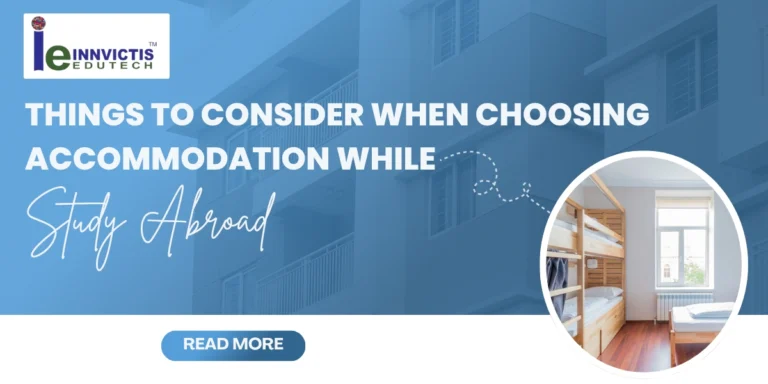Studying abroad is an exciting step that opens up a world of new opportunities, from exploring different cultures to accessing top-notch education. Whether you’re applying for scholarships to study abroad or searching for the best country, choosing where to live is a crucial part of your journey. Shared housing, such as student apartments, residential apartments, or other student housing options, is a common choice for international students. In this blog, we’ll explore what to consider, the pros and cons, and how to find the right shared housing for your time abroad.
Factors to Consider When Choosing Shared Housing for Students Studying Abroad
Finding the right place to live can make a big difference in your study abroad experience. Here are a few things to look out for:
- Budget: Shared housing is generally more affordable than living alone. Make sure to include all costs, such as rent, utilities, and internet, in your calculations.
- Location: Consider how close the housing is to your study abroad campus, public transportation, grocery stores, and other essential services.
- Safety: Research the neighborhood and look for secure buildings with features like controlled entry, security cameras, or on-site staff.
- Roommates: If possible, learn about your potential roommates in advance. Compatibility in terms of lifestyle and habits can make shared living much smoother.
- Amenities: Check if the student apartment or residential apartment is furnished and whether it includes laundry facilities, a kitchen, and common areas.
- Lease Terms: Make sure the lease aligns with your study abroad program dates and offers flexibility in case your plans change.
- Student Visa Requirements: Some countries require proof of accommodation for your student visa application, so ensure your housing choice meets these requirements.”
Pros of Shared Housing for Students Studying Abroad
Shared housing provides a range of valuable advantages for international students:
- Affordability: Sharing rent and utility costs makes living abroad more financially manageable, especially for students on a budget or those with scholarships.
- Community: Living with other students can help you build friendships quickly and create a support network in a new country.
- Skill Development: Managing a shared household teaches valuable life skills such as budgeting, communication, and conflict resolution.
- Cultural Exchange: Roommates from different backgrounds provide opportunities to learn about new cultures, languages, and perspectives.
- Convenience:Many student apartments are close to universities and offer flexible lease terms that align with academic schedules
Cons of Shared Housing for Students Studying Abroad
While shared housing has many advantages, it also comes with challenges:
- Limited Privacy: Sharing common spaces means you’ll have less personal space and may need to compromise on your routines.
- Potential Conflicts: Differences in habits, cleanliness, or schedules can sometimes lead to disagreements among roommates.
- Adjustment Period: Adapting to new living arrangements, especially in a different culture, can take time and may be stressful at first.
- Shared Responsibilities: Dividing chores and bills fairly requires good communication and cooperation from everyone involved.
How to Find and Choose the Right Shared Housing
Here are some practical steps to help you secure the best shared housing for your study abroad experience:
- University Resources: Many universities offer on-campus student housing or maintain lists of trusted off-campus options. Start by checking with your international student office.
- Reputable Websites: Use platforms like Student.com, Uniplaces, or Studyabroadapartments.com to find verified listings tailored for international students.
- Social Media and Student Groups: Join Facebook groups or forums for students in your destination city to find housing leads and honest reviews.
- Alumni Advice: Reach out to students who have already studied in your chosen country; they can offer valuable insights and recommendations.
- Visit if Possible: Arriving early to view apartments in person can help you avoid scams and ensure the place meets your expectations.
- Read the Lease Carefully: Understand all terms and conditions, including what’s included in the rent and any house rules.
Choosing suitable shared housing is an essential step in maximizing the value and success of your study abroad experience. While it offers affordability, community, and a chance to develop important life skills, it also requires flexibility and good communication. By considering your needs, researching your options, and using available resources, you can find a student apartment or residential apartment that supports your academic and personal growth. Don’t forget to check student visa requirements and explore scholarships to make your journey smooth and successful. Enjoy every moment of your international student adventure!
Frequently Asked Questions (FAQs)
1. Is shared housing cheaper than university dorms?
Yes, in many cases. Shared housing allows you to split rent and utility costs with roommates, which can be more affordable than staying in university dorms, especially in large cities.
2. How do I find reliable roommates in a foreign country?
Use verified housing platforms, university forums, or international student groups on social media. Some platforms also allow you to see roommate profiles or reviews.
3. Is it safe to book shared housing online before arrival?
Only if you’re using verified platforms or university-recommended housing. Avoid sending money through unsecure channels, and always request a video tour or check reviews.
4. What if I don’t get along with my roommates?
Open communication is key. Set clear expectations early. If issues persist, speak to your housing provider, landlord, or university’s accommodation office for solutions or transfers.







